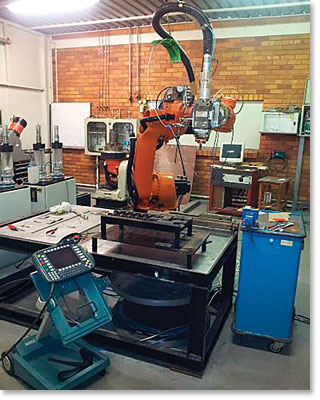Sustainable lasers
The role of laser technologies in sustainable manufacturing processes. (An SPIE Professional article.)
The UN, which is working toward 17 goals for sustainable development by 2030, has defined sustainable manufacturing as that which "meets the needs of the present without compromising the ability of future generations to meet their own needs."
State-of-the-art photonics may seem a remote concept when considering manufacturing processes and sustainability on the African continent. But collaborations among international partners are opening new avenues for photonics research and industry, where they may help to reshape energy- and waste-intensive manufacturing practices in some of the continent's strongest economies.
Science and technology have "a meaningful role to play in the development of sustainable manufacturing knowledge and technology," said Sechaba Tsubella, a chemical engineer and deputy director of advanced manufacturing technologies at South Africa's Department of Science and Technology.
But his country must first "come to terms with a definition of what it means to be sustainable," he told attendees at a Sustainable Materials Processing and Manufacturing conference at the University of Johannesburg in January.
At this conference, scientists and engineers from industry and academia highlighted the laser-assisted processes that are helping to reduce manufacturing costs and wastes while simultaneously increasing efficiency and quality.
Representatives from academia, industry, and government offered examples of laser technologies that can help move South Africa and other developing countries toward defining and meeting international goals for sustainability. Yet all face the reality that disparate knowledge, resources, and policies in different parts of the world slow progress toward realizing the potential of laser-assisted technologies to build locally sustainable processes.

Academics and scientists have limited equipment for laser beam forming in South Africa but have used platforms like this at the University of Johannesburg to the utmost.
Courtesy Stephen Akinlabi
Wilson R. Nyemba, engineer and researcher with the Department of Mechanical Engineering Science at the University of Johannesburg, documented the challenges in procuring basic engineering equipment at higher education institutions in Sub-Saharan Africa.
Many laboratories have obsolete or poorly functioning equipment, obtained during the colonial era (1960-80) when institutions such as the University of Zimbabwe were managed as colleges of European universities. When these colleges became independent universities, their founders gradually returned home but did not leave sufficient plans for equipment replacement or repair. This resulted in obsolescence, underutilization, or disrepair, with no capacity to withstand setbacks.
Through his research, Nyemba has developed a strategic model that employs a holistic approach to drive "Smart Procurement Partnership" collaborations between universities and private sector industry. The aim is to build capacity in equipment maintenance and management during engineer training programs, while ultimately reducing foreign aid dependence.
He highlights the need to establish links with the private sector to improve institutions' access to modern equipment. Similarly, exposure to modern engineering practice and new technology is best achieved through industry-relevant research, he says.
His exemplary efforts have fostered nurturing partnerships with industry, while developing long-term frameworks for training, capacity building, and sustainability within universities.

Rachel Berkowitz is a US-based freelance science writer. In an article in the July 2017 issue of SPIE Professional, she discusses the role of laser technologies in sustainable manufacturing processes in the developing world.
Read the full article about laser technologies in SPIE Professional.



